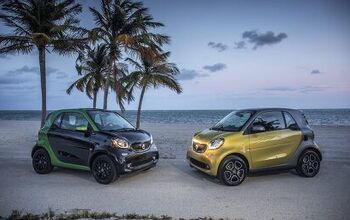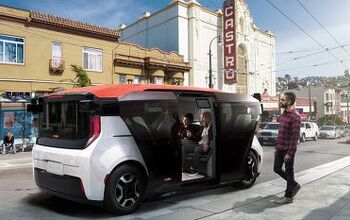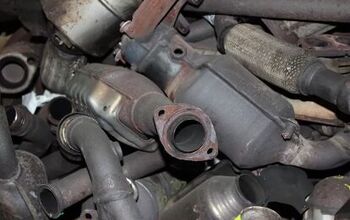The End of the Line for Internal Combustion Volkswagens?

Certain green-tinged websites would sure want you to believe it. At the Handelsblatt automotive summit in Volkswagen’s home base of Wolfsburg, Germany this week, VW strategy chief Michael Jost etched a tombstone for the internal combustion engine.
But is the coming decade really the last one to feature VWs with exhaust pipes?
Nope, but that’s when the *end* of the beginning of the end arrives.
The automaker sure talks a great game when it comes to electric vehicles (VW Group targets 3 million EV sales per year by 2025), and has set aside billions for the development and assembly of electric vehicles across the globe. The first I.D.-badged vehicles should begin rolling out of factories at the dawn of the new decade.
Still, look around and what do you see? Tiguans and Atlases. Jettas and Golfs. Can VW persuade the roadgoing public to shun ICEs for battery packs and charging cords? The company’s banking on it. Jost told the crowd his company was working on “the last platform for vehicles that aren’t CO2 neutral.”
This platform will start underpinning vehicles in 2026, he said.
“We’re gradually fading out combustion engines to the absolute minimum,” he added. This platform will carry VW vehicles and those of other VW Group brands into the 2030s, presumably as EV sales gather in the background. It’s possible that, at that point, gasoline-powered vehicles could be relegated to a niche market in ICE-unfriendly Europe and other regions. Not in North America, though.
As EV market share grows, more and more vehicles are coming outfitted with standard mild hybrid systems, while the plug-in hybrid market is also on the upswing. Slowly, pure ICE vehicles will be bled out of automaker lineups, including VW’s.
So, exactly when does Jost envision the last VW vehicle with an internal combustion engine to roll out of the factory? There’s an answer for that: 2040.
[Source: The Local] [Image: Volkswagen]

More by Steph Willems
Latest Car Reviews
Read moreLatest Product Reviews
Read moreRecent Comments
- Redapple2 CX5. Rented one 2 yr ago. ~2000miles. Issues. 1 Thumbwheel controller not good. 2. Sweeping curve on the interstate passing a car, the automatic braking picked up a car in the lane over. Beeps and slight braking. Not drop anchor mode, but still head scratching. But it looks so dam good. Wonderful still after many years. CX5 all the way!!!
- Tassos [list=1][*]Mercedes e-class diesel. Rebuilt and true mileage unknown [/*][*]Mercedes e-class diesel. Lemon law buyback shipped from New Jersey to its new home in eastern europe[/*][*]1991 Honda civic that i drove well past its expiration date (2016!) [/*][*]Mary Barra once turned me down for a McDonald’s dinner date[/*][*]biden dollars[/*][*]breadvan on stilts [/*][/list=1]
- Gray My driver is a Brilliant Blue '93 Ranger Sport with the obnoxious green and purple decals still intact. I like the color, but those decals are silly. Everyone at work under 35 begs me to not remove them. Out of the 40-ish cars I've had, I think I've had only 3 non-color cars. A white El Camino, A black 300ZX, and a Black '73 Dodge truck.I love all the color names car companies had in the early '70's.
- Kwik_Shift_Pro4X Mazda CX-5 all the way.
- FreedMike CX-5 for the win, even in base version. 1) Far better looking. 2) Mazda dealers will actually give you a decent deal on the CX-5; Toyota dealers still think it's 2021 and are trying to get over sticker.


































Comments
Join the conversation
It'd be cool to have a car that _couldn't_ mess up your garage floor but I don't want to have to learn all that Reddy Kilowatt jargon.
I heard lithium is in short supply now and there are no untapped reserves. Your employer isn't going to wire your parking lot with outlets and give you free electricity either. Most of our electricity comes from fossil fuels so what's the advantage?